BSc Business Management: BMP3004 World of Work Motivation
VerifiedAdded on 2022/11/28
|8
|2048
|135
Report
AI Summary
This report, submitted for a BSc (Hons) in Business Management, explores the multifaceted concept of employee motivation within the contemporary business landscape. It begins by defining motivation, differentiating between intrinsic and extrinsic drivers, and then delves into Maslow's Hierarchy of Needs as a foundational motivational theory. The report identifies key factors that motivate employees, such as salary, promotion opportunities, and a positive work environment, while also acknowledging the positive outcomes, like networking, job security, and career development. It further addresses negative factors, including workplace conflicts, discrimination, and lack of innovation, and proposes strategies for mitigating their adverse effects. Finally, the report emphasizes the crucial role of motivation in enhancing employee performance and organizational success, concluding that understanding and addressing motivational factors is essential for effective management.
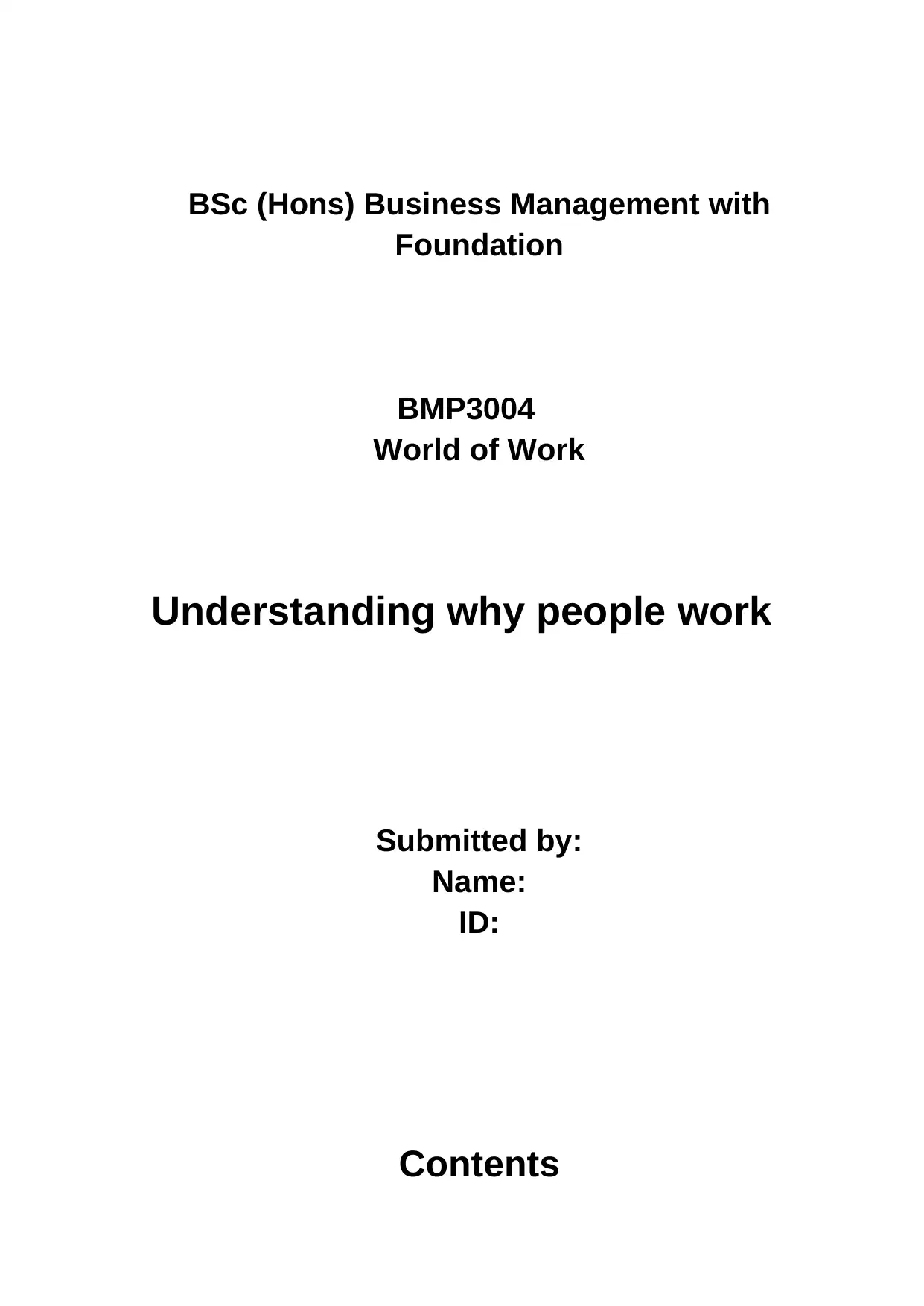
BSc (Hons) Business Management with
Foundation
BMP3004
World of Work
Understanding why people work
Submitted by:
Name:
ID:
Contents
Foundation
BMP3004
World of Work
Understanding why people work
Submitted by:
Name:
ID:
Contents
Paraphrase This Document
Need a fresh take? Get an instant paraphrase of this document with our AI Paraphraser
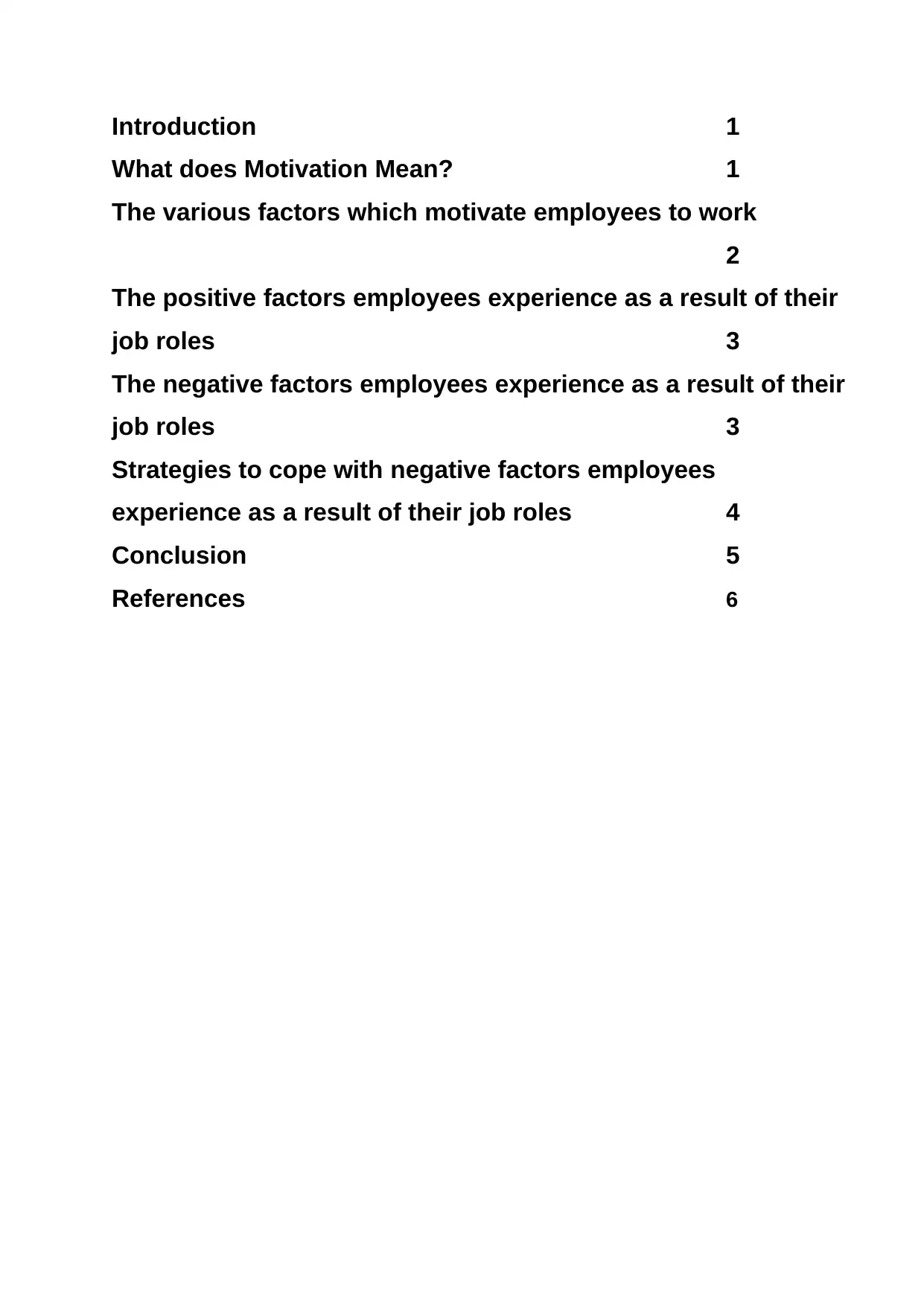
Introduction 1
What does Motivation Mean? 1
The various factors which motivate employees to work
2
The positive factors employees experience as a result of their
job roles 3
The negative factors employees experience as a result of their
job roles 3
Strategies to cope with negative factors employees
experience as a result of their job roles 4
Conclusion 5
References 6
What does Motivation Mean? 1
The various factors which motivate employees to work
2
The positive factors employees experience as a result of their
job roles 3
The negative factors employees experience as a result of their
job roles 3
Strategies to cope with negative factors employees
experience as a result of their job roles 4
Conclusion 5
References 6
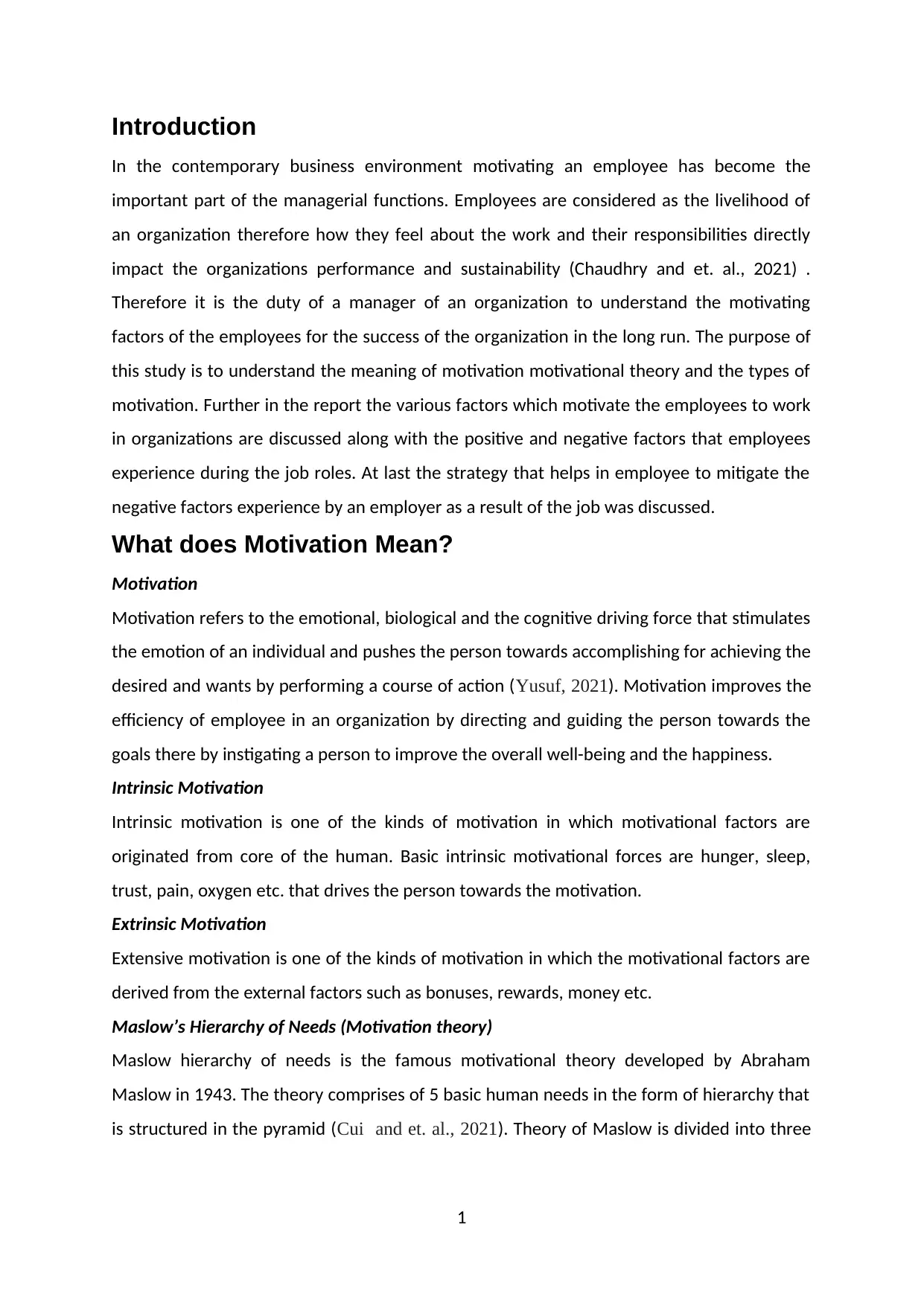
Introduction
In the contemporary business environment motivating an employee has become the
important part of the managerial functions. Employees are considered as the livelihood of
an organization therefore how they feel about the work and their responsibilities directly
impact the organizations performance and sustainability (Chaudhry and et. al., 2021) .
Therefore it is the duty of a manager of an organization to understand the motivating
factors of the employees for the success of the organization in the long run. The purpose of
this study is to understand the meaning of motivation motivational theory and the types of
motivation. Further in the report the various factors which motivate the employees to work
in organizations are discussed along with the positive and negative factors that employees
experience during the job roles. At last the strategy that helps in employee to mitigate the
negative factors experience by an employer as a result of the job was discussed.
What does Motivation Mean?
Motivation
Motivation refers to the emotional, biological and the cognitive driving force that stimulates
the emotion of an individual and pushes the person towards accomplishing for achieving the
desired and wants by performing a course of action (Yusuf, 2021). Motivation improves the
efficiency of employee in an organization by directing and guiding the person towards the
goals there by instigating a person to improve the overall well-being and the happiness.
Intrinsic Motivation
Intrinsic motivation is one of the kinds of motivation in which motivational factors are
originated from core of the human. Basic intrinsic motivational forces are hunger, sleep,
trust, pain, oxygen etc. that drives the person towards the motivation.
Extrinsic Motivation
Extensive motivation is one of the kinds of motivation in which the motivational factors are
derived from the external factors such as bonuses, rewards, money etc.
Maslow’s Hierarchy of Needs (Motivation theory)
Maslow hierarchy of needs is the famous motivational theory developed by Abraham
Maslow in 1943. The theory comprises of 5 basic human needs in the form of hierarchy that
is structured in the pyramid (Cui and et. al., 2021). Theory of Maslow is divided into three
1
In the contemporary business environment motivating an employee has become the
important part of the managerial functions. Employees are considered as the livelihood of
an organization therefore how they feel about the work and their responsibilities directly
impact the organizations performance and sustainability (Chaudhry and et. al., 2021) .
Therefore it is the duty of a manager of an organization to understand the motivating
factors of the employees for the success of the organization in the long run. The purpose of
this study is to understand the meaning of motivation motivational theory and the types of
motivation. Further in the report the various factors which motivate the employees to work
in organizations are discussed along with the positive and negative factors that employees
experience during the job roles. At last the strategy that helps in employee to mitigate the
negative factors experience by an employer as a result of the job was discussed.
What does Motivation Mean?
Motivation
Motivation refers to the emotional, biological and the cognitive driving force that stimulates
the emotion of an individual and pushes the person towards accomplishing for achieving the
desired and wants by performing a course of action (Yusuf, 2021). Motivation improves the
efficiency of employee in an organization by directing and guiding the person towards the
goals there by instigating a person to improve the overall well-being and the happiness.
Intrinsic Motivation
Intrinsic motivation is one of the kinds of motivation in which motivational factors are
originated from core of the human. Basic intrinsic motivational forces are hunger, sleep,
trust, pain, oxygen etc. that drives the person towards the motivation.
Extrinsic Motivation
Extensive motivation is one of the kinds of motivation in which the motivational factors are
derived from the external factors such as bonuses, rewards, money etc.
Maslow’s Hierarchy of Needs (Motivation theory)
Maslow hierarchy of needs is the famous motivational theory developed by Abraham
Maslow in 1943. The theory comprises of 5 basic human needs in the form of hierarchy that
is structured in the pyramid (Cui and et. al., 2021). Theory of Maslow is divided into three
1
⊘ This is a preview!⊘
Do you want full access?
Subscribe today to unlock all pages.

Trusted by 1+ million students worldwide
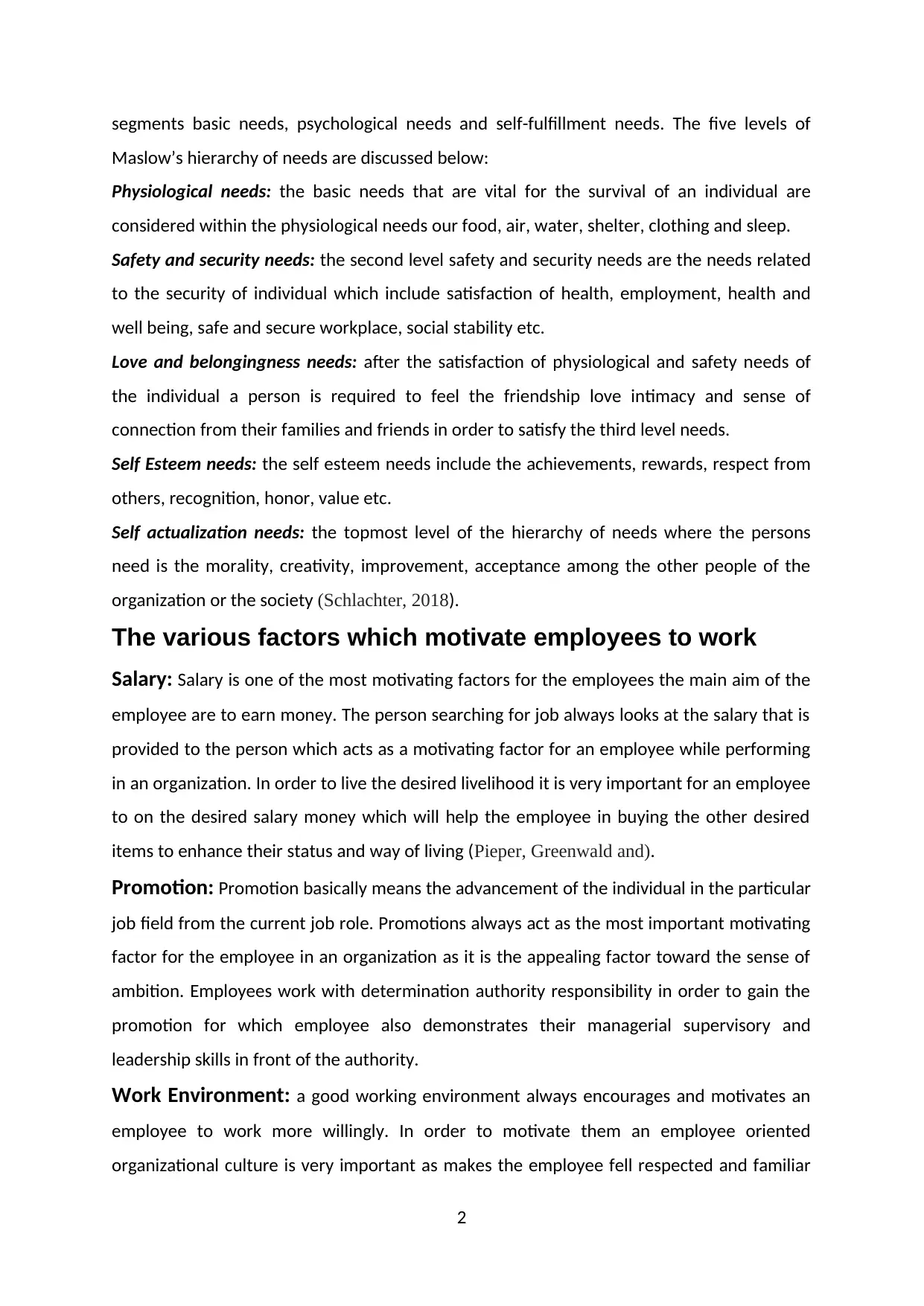
segments basic needs, psychological needs and self-fulfillment needs. The five levels of
Maslow’s hierarchy of needs are discussed below:
Physiological needs: the basic needs that are vital for the survival of an individual are
considered within the physiological needs our food, air, water, shelter, clothing and sleep.
Safety and security needs: the second level safety and security needs are the needs related
to the security of individual which include satisfaction of health, employment, health and
well being, safe and secure workplace, social stability etc.
Love and belongingness needs: after the satisfaction of physiological and safety needs of
the individual a person is required to feel the friendship love intimacy and sense of
connection from their families and friends in order to satisfy the third level needs.
Self Esteem needs: the self esteem needs include the achievements, rewards, respect from
others, recognition, honor, value etc.
Self actualization needs: the topmost level of the hierarchy of needs where the persons
need is the morality, creativity, improvement, acceptance among the other people of the
organization or the society (Schlachter, 2018).
The various factors which motivate employees to work
Salary: Salary is one of the most motivating factors for the employees the main aim of the
employee are to earn money. The person searching for job always looks at the salary that is
provided to the person which acts as a motivating factor for an employee while performing
in an organization. In order to live the desired livelihood it is very important for an employee
to on the desired salary money which will help the employee in buying the other desired
items to enhance their status and way of living (Pieper, Greenwald and).
Promotion: Promotion basically means the advancement of the individual in the particular
job field from the current job role. Promotions always act as the most important motivating
factor for the employee in an organization as it is the appealing factor toward the sense of
ambition. Employees work with determination authority responsibility in order to gain the
promotion for which employee also demonstrates their managerial supervisory and
leadership skills in front of the authority.
Work Environment: a good working environment always encourages and motivates an
employee to work more willingly. In order to motivate them an employee oriented
organizational culture is very important as makes the employee fell respected and familiar
2
Maslow’s hierarchy of needs are discussed below:
Physiological needs: the basic needs that are vital for the survival of an individual are
considered within the physiological needs our food, air, water, shelter, clothing and sleep.
Safety and security needs: the second level safety and security needs are the needs related
to the security of individual which include satisfaction of health, employment, health and
well being, safe and secure workplace, social stability etc.
Love and belongingness needs: after the satisfaction of physiological and safety needs of
the individual a person is required to feel the friendship love intimacy and sense of
connection from their families and friends in order to satisfy the third level needs.
Self Esteem needs: the self esteem needs include the achievements, rewards, respect from
others, recognition, honor, value etc.
Self actualization needs: the topmost level of the hierarchy of needs where the persons
need is the morality, creativity, improvement, acceptance among the other people of the
organization or the society (Schlachter, 2018).
The various factors which motivate employees to work
Salary: Salary is one of the most motivating factors for the employees the main aim of the
employee are to earn money. The person searching for job always looks at the salary that is
provided to the person which acts as a motivating factor for an employee while performing
in an organization. In order to live the desired livelihood it is very important for an employee
to on the desired salary money which will help the employee in buying the other desired
items to enhance their status and way of living (Pieper, Greenwald and).
Promotion: Promotion basically means the advancement of the individual in the particular
job field from the current job role. Promotions always act as the most important motivating
factor for the employee in an organization as it is the appealing factor toward the sense of
ambition. Employees work with determination authority responsibility in order to gain the
promotion for which employee also demonstrates their managerial supervisory and
leadership skills in front of the authority.
Work Environment: a good working environment always encourages and motivates an
employee to work more willingly. In order to motivate them an employee oriented
organizational culture is very important as makes the employee fell respected and familiar
2
Paraphrase This Document
Need a fresh take? Get an instant paraphrase of this document with our AI Paraphraser
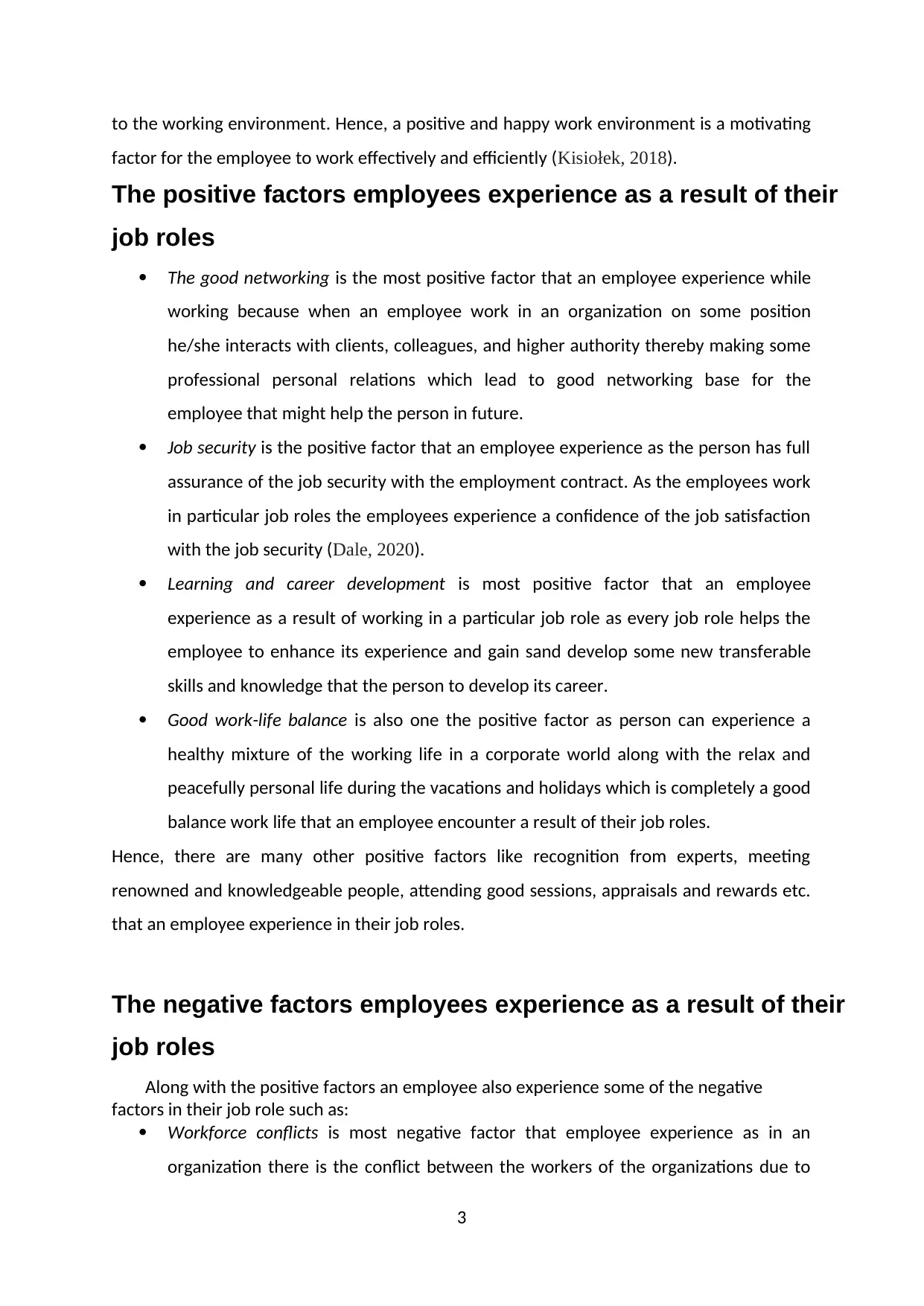
to the working environment. Hence, a positive and happy work environment is a motivating
factor for the employee to work effectively and efficiently (Kisiołek, 2018).
The positive factors employees experience as a result of their
job roles
The good networking is the most positive factor that an employee experience while
working because when an employee work in an organization on some position
he/she interacts with clients, colleagues, and higher authority thereby making some
professional personal relations which lead to good networking base for the
employee that might help the person in future.
Job security is the positive factor that an employee experience as the person has full
assurance of the job security with the employment contract. As the employees work
in particular job roles the employees experience a confidence of the job satisfaction
with the job security (Dale, 2020).
Learning and career development is most positive factor that an employee
experience as a result of working in a particular job role as every job role helps the
employee to enhance its experience and gain sand develop some new transferable
skills and knowledge that the person to develop its career.
Good work-life balance is also one the positive factor as person can experience a
healthy mixture of the working life in a corporate world along with the relax and
peacefully personal life during the vacations and holidays which is completely a good
balance work life that an employee encounter a result of their job roles.
Hence, there are many other positive factors like recognition from experts, meeting
renowned and knowledgeable people, attending good sessions, appraisals and rewards etc.
that an employee experience in their job roles.
The negative factors employees experience as a result of their
job roles
Along with the positive factors an employee also experience some of the negative
factors in their job role such as:
Workforce conflicts is most negative factor that employee experience as in an
organization there is the conflict between the workers of the organizations due to
3
factor for the employee to work effectively and efficiently (Kisiołek, 2018).
The positive factors employees experience as a result of their
job roles
The good networking is the most positive factor that an employee experience while
working because when an employee work in an organization on some position
he/she interacts with clients, colleagues, and higher authority thereby making some
professional personal relations which lead to good networking base for the
employee that might help the person in future.
Job security is the positive factor that an employee experience as the person has full
assurance of the job security with the employment contract. As the employees work
in particular job roles the employees experience a confidence of the job satisfaction
with the job security (Dale, 2020).
Learning and career development is most positive factor that an employee
experience as a result of working in a particular job role as every job role helps the
employee to enhance its experience and gain sand develop some new transferable
skills and knowledge that the person to develop its career.
Good work-life balance is also one the positive factor as person can experience a
healthy mixture of the working life in a corporate world along with the relax and
peacefully personal life during the vacations and holidays which is completely a good
balance work life that an employee encounter a result of their job roles.
Hence, there are many other positive factors like recognition from experts, meeting
renowned and knowledgeable people, attending good sessions, appraisals and rewards etc.
that an employee experience in their job roles.
The negative factors employees experience as a result of their
job roles
Along with the positive factors an employee also experience some of the negative
factors in their job role such as:
Workforce conflicts is most negative factor that employee experience as in an
organization there is the conflict between the workers of the organizations due to
3
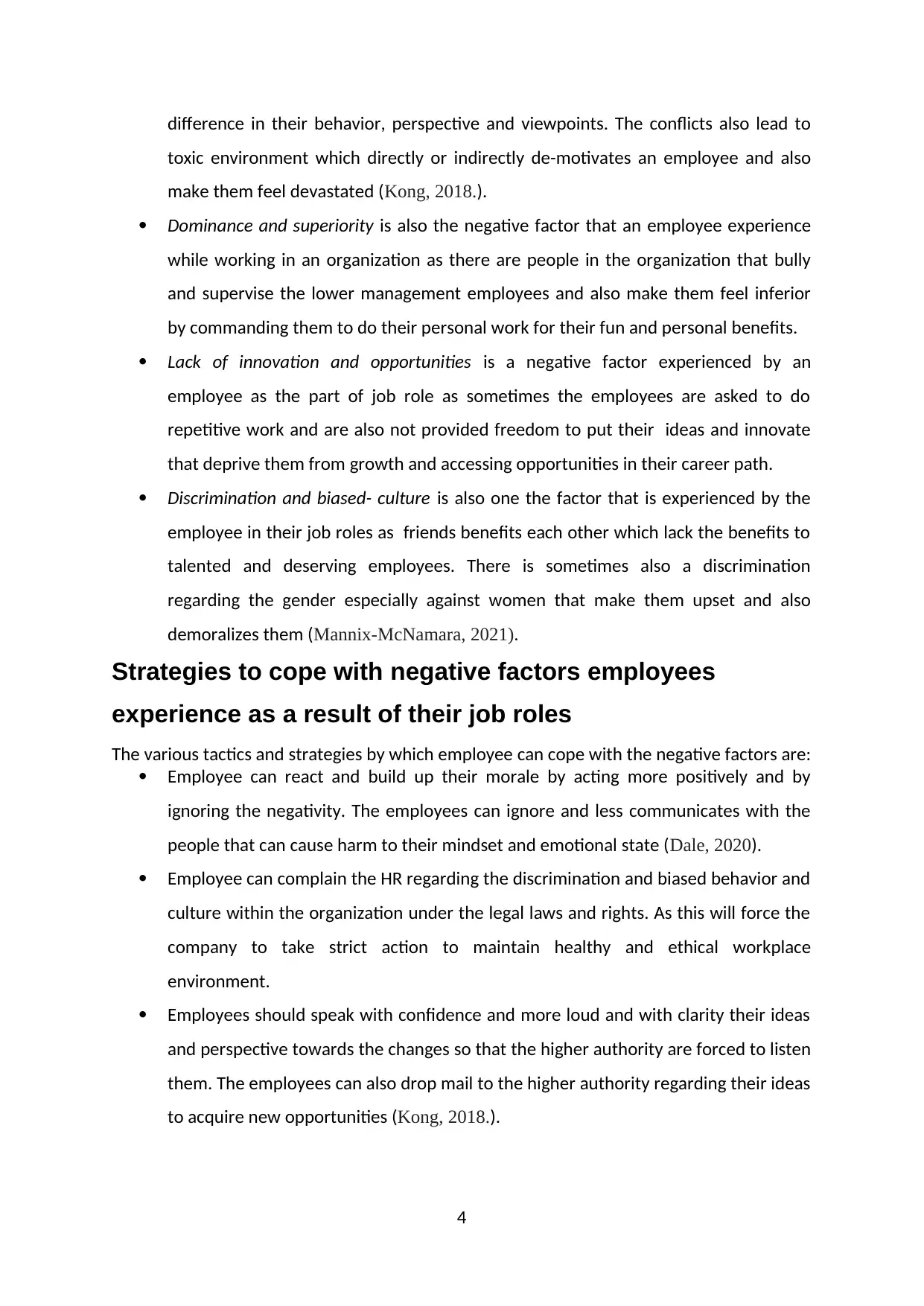
difference in their behavior, perspective and viewpoints. The conflicts also lead to
toxic environment which directly or indirectly de-motivates an employee and also
make them feel devastated (Kong, 2018.).
Dominance and superiority is also the negative factor that an employee experience
while working in an organization as there are people in the organization that bully
and supervise the lower management employees and also make them feel inferior
by commanding them to do their personal work for their fun and personal benefits.
Lack of innovation and opportunities is a negative factor experienced by an
employee as the part of job role as sometimes the employees are asked to do
repetitive work and are also not provided freedom to put their ideas and innovate
that deprive them from growth and accessing opportunities in their career path.
Discrimination and biased- culture is also one the factor that is experienced by the
employee in their job roles as friends benefits each other which lack the benefits to
talented and deserving employees. There is sometimes also a discrimination
regarding the gender especially against women that make them upset and also
demoralizes them (Mannix-McNamara, 2021).
Strategies to cope with negative factors employees
experience as a result of their job roles
The various tactics and strategies by which employee can cope with the negative factors are:
Employee can react and build up their morale by acting more positively and by
ignoring the negativity. The employees can ignore and less communicates with the
people that can cause harm to their mindset and emotional state (Dale, 2020).
Employee can complain the HR regarding the discrimination and biased behavior and
culture within the organization under the legal laws and rights. As this will force the
company to take strict action to maintain healthy and ethical workplace
environment.
Employees should speak with confidence and more loud and with clarity their ideas
and perspective towards the changes so that the higher authority are forced to listen
them. The employees can also drop mail to the higher authority regarding their ideas
to acquire new opportunities (Kong, 2018.).
4
toxic environment which directly or indirectly de-motivates an employee and also
make them feel devastated (Kong, 2018.).
Dominance and superiority is also the negative factor that an employee experience
while working in an organization as there are people in the organization that bully
and supervise the lower management employees and also make them feel inferior
by commanding them to do their personal work for their fun and personal benefits.
Lack of innovation and opportunities is a negative factor experienced by an
employee as the part of job role as sometimes the employees are asked to do
repetitive work and are also not provided freedom to put their ideas and innovate
that deprive them from growth and accessing opportunities in their career path.
Discrimination and biased- culture is also one the factor that is experienced by the
employee in their job roles as friends benefits each other which lack the benefits to
talented and deserving employees. There is sometimes also a discrimination
regarding the gender especially against women that make them upset and also
demoralizes them (Mannix-McNamara, 2021).
Strategies to cope with negative factors employees
experience as a result of their job roles
The various tactics and strategies by which employee can cope with the negative factors are:
Employee can react and build up their morale by acting more positively and by
ignoring the negativity. The employees can ignore and less communicates with the
people that can cause harm to their mindset and emotional state (Dale, 2020).
Employee can complain the HR regarding the discrimination and biased behavior and
culture within the organization under the legal laws and rights. As this will force the
company to take strict action to maintain healthy and ethical workplace
environment.
Employees should speak with confidence and more loud and with clarity their ideas
and perspective towards the changes so that the higher authority are forced to listen
them. The employees can also drop mail to the higher authority regarding their ideas
to acquire new opportunities (Kong, 2018.).
4
⊘ This is a preview!⊘
Do you want full access?
Subscribe today to unlock all pages.

Trusted by 1+ million students worldwide
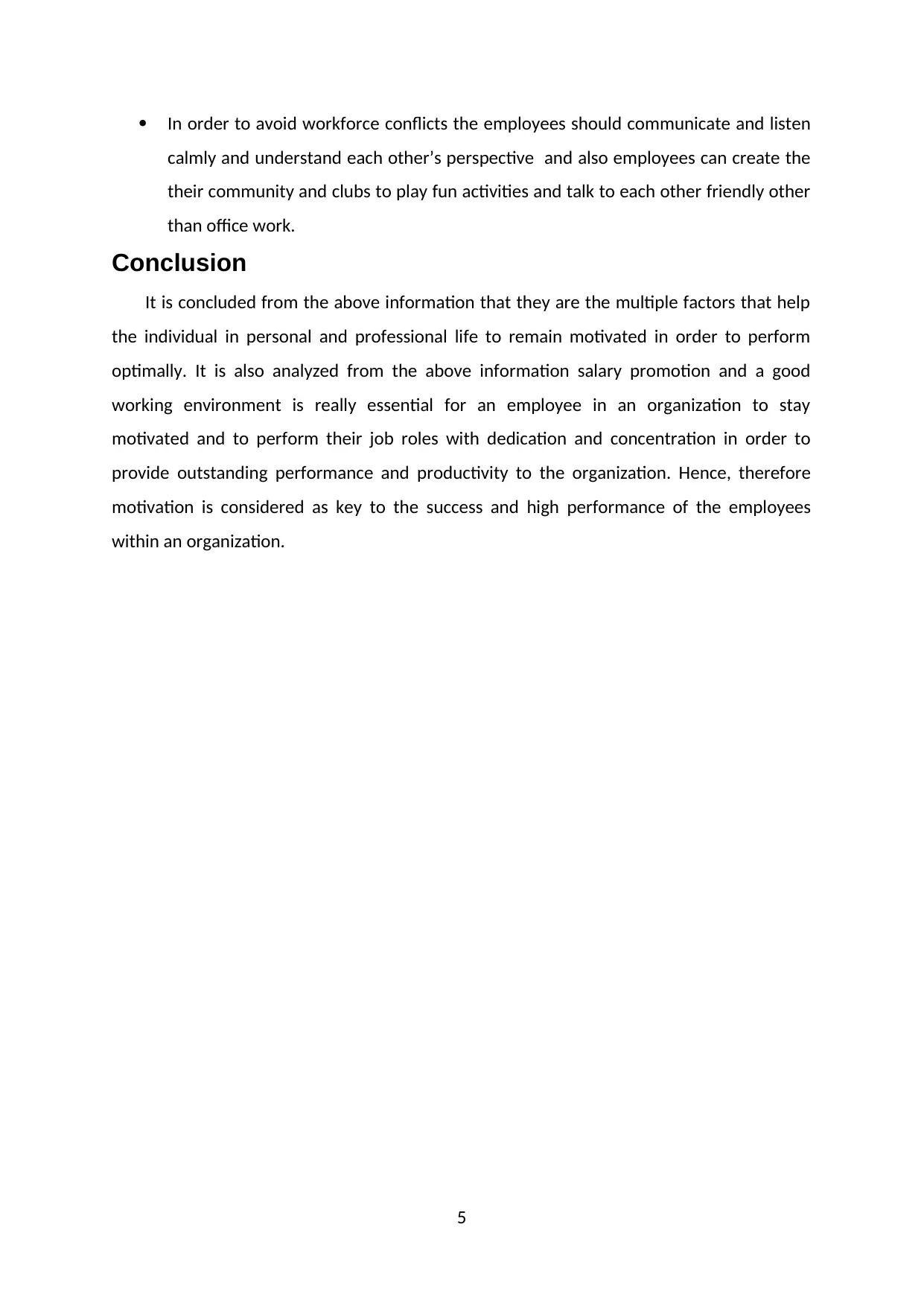
In order to avoid workforce conflicts the employees should communicate and listen
calmly and understand each other’s perspective and also employees can create the
their community and clubs to play fun activities and talk to each other friendly other
than office work.
Conclusion
It is concluded from the above information that they are the multiple factors that help
the individual in personal and professional life to remain motivated in order to perform
optimally. It is also analyzed from the above information salary promotion and a good
working environment is really essential for an employee in an organization to stay
motivated and to perform their job roles with dedication and concentration in order to
provide outstanding performance and productivity to the organization. Hence, therefore
motivation is considered as key to the success and high performance of the employees
within an organization.
5
calmly and understand each other’s perspective and also employees can create the
their community and clubs to play fun activities and talk to each other friendly other
than office work.
Conclusion
It is concluded from the above information that they are the multiple factors that help
the individual in personal and professional life to remain motivated in order to perform
optimally. It is also analyzed from the above information salary promotion and a good
working environment is really essential for an employee in an organization to stay
motivated and to perform their job roles with dedication and concentration in order to
provide outstanding performance and productivity to the organization. Hence, therefore
motivation is considered as key to the success and high performance of the employees
within an organization.
5
Paraphrase This Document
Need a fresh take? Get an instant paraphrase of this document with our AI Paraphraser
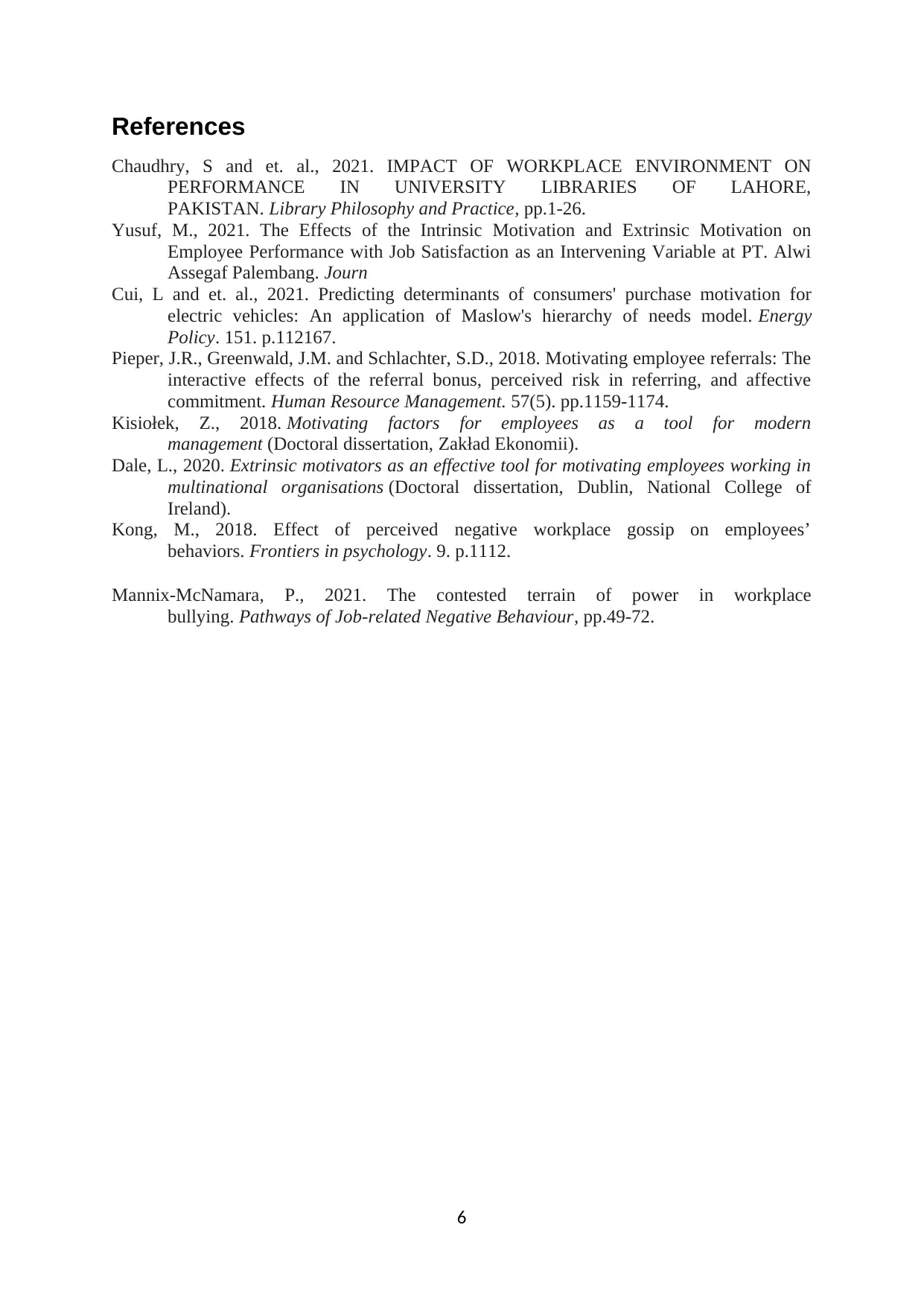
References
Chaudhry, S and et. al., 2021. IMPACT OF WORKPLACE ENVIRONMENT ON
PERFORMANCE IN UNIVERSITY LIBRARIES OF LAHORE,
PAKISTAN. Library Philosophy and Practice, pp.1-26.
Yusuf, M., 2021. The Effects of the Intrinsic Motivation and Extrinsic Motivation on
Employee Performance with Job Satisfaction as an Intervening Variable at PT. Alwi
Assegaf Palembang. Journ
Cui, L and et. al., 2021. Predicting determinants of consumers' purchase motivation for
electric vehicles: An application of Maslow's hierarchy of needs model. Energy
Policy. 151. p.112167.
Pieper, J.R., Greenwald, J.M. and Schlachter, S.D., 2018. Motivating employee referrals: The
interactive effects of the referral bonus, perceived risk in referring, and affective
commitment. Human Resource Management. 57(5). pp.1159-1174.
Kisiołek, Z., 2018. Motivating factors for employees as a tool for modern
management (Doctoral dissertation, Zakład Ekonomii).
Dale, L., 2020. Extrinsic motivators as an effective tool for motivating employees working in
multinational organisations (Doctoral dissertation, Dublin, National College of
Ireland).
Kong, M., 2018. Effect of perceived negative workplace gossip on employees’
behaviors. Frontiers in psychology. 9. p.1112.
Mannix-McNamara, P., 2021. The contested terrain of power in workplace
bullying. Pathways of Job-related Negative Behaviour, pp.49-72.
6
Chaudhry, S and et. al., 2021. IMPACT OF WORKPLACE ENVIRONMENT ON
PERFORMANCE IN UNIVERSITY LIBRARIES OF LAHORE,
PAKISTAN. Library Philosophy and Practice, pp.1-26.
Yusuf, M., 2021. The Effects of the Intrinsic Motivation and Extrinsic Motivation on
Employee Performance with Job Satisfaction as an Intervening Variable at PT. Alwi
Assegaf Palembang. Journ
Cui, L and et. al., 2021. Predicting determinants of consumers' purchase motivation for
electric vehicles: An application of Maslow's hierarchy of needs model. Energy
Policy. 151. p.112167.
Pieper, J.R., Greenwald, J.M. and Schlachter, S.D., 2018. Motivating employee referrals: The
interactive effects of the referral bonus, perceived risk in referring, and affective
commitment. Human Resource Management. 57(5). pp.1159-1174.
Kisiołek, Z., 2018. Motivating factors for employees as a tool for modern
management (Doctoral dissertation, Zakład Ekonomii).
Dale, L., 2020. Extrinsic motivators as an effective tool for motivating employees working in
multinational organisations (Doctoral dissertation, Dublin, National College of
Ireland).
Kong, M., 2018. Effect of perceived negative workplace gossip on employees’
behaviors. Frontiers in psychology. 9. p.1112.
Mannix-McNamara, P., 2021. The contested terrain of power in workplace
bullying. Pathways of Job-related Negative Behaviour, pp.49-72.
6
1 out of 8
Related Documents
Your All-in-One AI-Powered Toolkit for Academic Success.
+13062052269
info@desklib.com
Available 24*7 on WhatsApp / Email
![[object Object]](/_next/static/media/star-bottom.7253800d.svg)
Unlock your academic potential
Copyright © 2020–2026 A2Z Services. All Rights Reserved. Developed and managed by ZUCOL.

